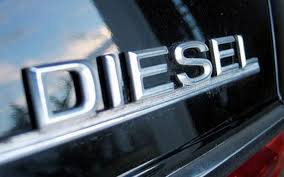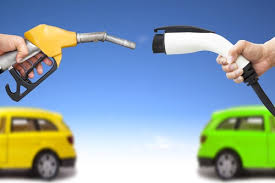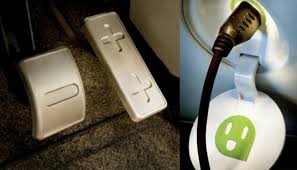The answer is, probably, yes, although there’s no need to panic just yet. In July, the Tax Strategy Group in the Department of Finance circulated a proposal that Ireland should start joining the UK, France and Belgium in eliminating the tax advantage enjoyed by diesel fuels.
The paper put forward a plan, which is being considered for introduction in this year’s Budget, that diesel fuel should be increased in price by €0.0218 per litre over five years, bringing it into parity with petrol.
Why the change?
 The reason given for this move, which overturns almost a decade of car buyers being encouraged into diesel cars because of their lower emissions of Co2, is because of concerns over air quality. The EU estimates that 430,000 people died prematurely in Europe last year because of air pollution and the diesel emissions scandal which has engulfed Volkswagen and others has done much to damage the reputation of diesel as a fuel for passenger cars.
The reason given for this move, which overturns almost a decade of car buyers being encouraged into diesel cars because of their lower emissions of Co2, is because of concerns over air quality. The EU estimates that 430,000 people died prematurely in Europe last year because of air pollution and the diesel emissions scandal which has engulfed Volkswagen and others has done much to damage the reputation of diesel as a fuel for passenger cars.
There is much in that which is right, but doubtless the Department of Finance is also looking at the €80-million year on year fall in revenue from motor tax. Even though we are buying more cars, we’re all opting for cars lower in Co2 emissions, largely diesels, and this is costing the Government considerable tax take. The diesel price increase, it is estimated, could bring in an extra €330-million at current fuel prices.
Is the environmental reason a valid one, though?
 Well according to Eoin Buckley, who’s one of the Irish representatives of environmental pressure group Transport & Environment, yes it is. “There is no basis on environmental and health grounds for diesel vehicles to have an advantage over petrol ones. By removing the fuel tax gap between diesel and petrol, diesel cars can compete on a level playing field” he said. “Diesel vehicles will be more expensive to run without what is effectively a subsidy through lower fuel tax. So Electric Vehicles (which are much cheaper to run) and hybrids will become more competitive in that sense. Also, diesel vehicles are more expensive to buy than petrols, so if consumers are encouraged to spend that extra money on hybrids instead this will lead to greater Co2 savings.”
Well according to Eoin Buckley, who’s one of the Irish representatives of environmental pressure group Transport & Environment, yes it is. “There is no basis on environmental and health grounds for diesel vehicles to have an advantage over petrol ones. By removing the fuel tax gap between diesel and petrol, diesel cars can compete on a level playing field” he said. “Diesel vehicles will be more expensive to run without what is effectively a subsidy through lower fuel tax. So Electric Vehicles (which are much cheaper to run) and hybrids will become more competitive in that sense. Also, diesel vehicles are more expensive to buy than petrols, so if consumers are encouraged to spend that extra money on hybrids instead this will lead to greater Co2 savings.”
Buckley also argues that this policy measure should be used to accelerate the transition toward sustainable electric transport. Electricity is already a significantly cleaner power source than oil, and will become more so in coming decades. From an energy diversity and dependence perspective, electricity is superior to diesel and petrol which is all imported. A shift to electrification of transport is an appealing vision, moving away from polluting, imported oil to clean indigenously-generated electricity, and, in the process, stimulating jobs, growth, and a more sustainable Ireland.
There are costs to this
 Plus there could, potentially, be a huge improvement in the quality of the air we all breathe, especially in city centres. But, of course, there’s a catch. The plan being put forward to Government only thus far mentions a rise in the price of diesel. There are no plans, at least not yet, to change the motor tax and VRT systems to reflect the growing concerns over air pollution – for the foreseeable, tax is only concerned with Co2, which will make switching to non-hybrids potentially expensive.
Plus there could, potentially, be a huge improvement in the quality of the air we all breathe, especially in city centres. But, of course, there’s a catch. The plan being put forward to Government only thus far mentions a rise in the price of diesel. There are no plans, at least not yet, to change the motor tax and VRT systems to reflect the growing concerns over air pollution – for the foreseeable, tax is only concerned with Co2, which will make switching to non-hybrids potentially expensive.
Then there is the problem of those who primarily buy second hand. While petrol engine technology has certainly been increasing and improving over the years, it’s really only the most recent and up-to-date units that get close to matching their diesel counterparts in this regard, so anyone buying a petrol-engined car of three years old or older is likely to see their motor tax bill increase, as well as their fuel pump bill if they’re doing big mileage.
Cost impact of the change
The initial increase isn’t much, but it’s sufficient that if you’re driving a car with a 60-litre fuel tank, it’s going to cost you an extra €67 to fill up once a week, over the course of a year. And then another €67 on top of that next year. And then again. And then again. And then again.
Switching to a hybrid can potentially bring your fuel bills and tax bills down, but they tend to be trickier to get the best economy out of – you have to alter your driving style to make them work at their best, and for long-haul drivers, diesel is still superior.
Still, there’s no doubt that Transport and Environment’s point is well made – diesel is dirtier and while it might be better for the planet, it’s worse by far for you and everyone around you. There’s really no reason to panic just yet; the proposal is just that for now, and there is much to be done before it’s enacted as law, leaving space for some of the tax regime to be altered to compensate, but it’s certainly worth thinking about switching to petrol, hybrid or even electric for your next purchase. While oil prices are historically low right now, a Europe-wide war has effectively been declared on diesel, and Ireland is the next battleground.